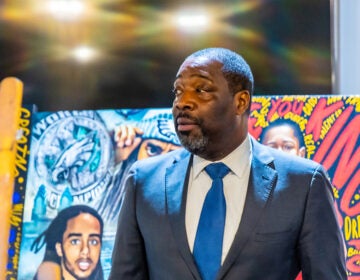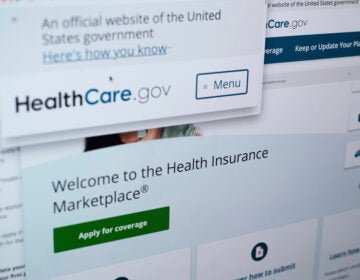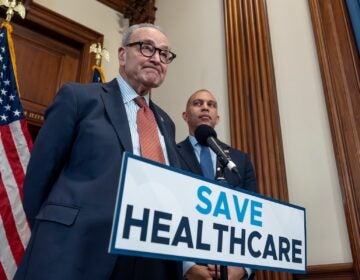Patrick Murphy talks about HBO documentary on ‘Don’t Ask Don’t Tell’
A former Pennsylvania congressman who fought to repeal Don’t Ask, Don’t Tell is celebrating the end of the controversial military policy. WHYY’s Elizabeth Fiedler spoke with Democrat Patrick Murphy of Bucks County about his position and about the HBO documentary featuring Murphy’s role in the national movement. Lizz asked Murphy, who served in the 82 Airborne Division in Iraq, to describe the policy’s effects.
MURPHY: When I served in the Army I saw so many great leaders get thrown out just because they happened to be gay. I mean when you serve in uniform–when you deploy to a place like Baghdad like I have–you could care less who people are writing home to. You care whether or not they can do their job: Could they handle an assault rifle? Elizabeth, I will tell you during that fight to repeal Don’t Ask, Don’t Tell, I got a letter from a company commander and he said, ‘I’m on my fourth deployment and my partner has said he’s not going to be there when I come home. So I’m here in Kabul, Afghanistan, it’s three o’clock in the morning and I’m holding a nine millimeter weapon to my head and I’m thinking about blowing my brains out because I’m gay. And I can’t go to my commander, I can’t go to an old battle buddy, I can’t even go to the chaplain because that means that I’ll be thrown out.” And he goes, “The reason why I’m not going to take my life is ’cause I know there’s an Iraq War veteran named Patrick Murphy fighting for me. And he said, “Sir please just keep fighting cause we’re counting on you.” And even during the darkest moments during that fight: the death threats, you know unfortunately we lost our Congressional race you know that letter put it in such proper perspective and how important it is and how many people are counting on us to do the right thing.FIEDLER: How do you think that the repeal of DADT might change the military? There have certainly been some concerns.MURPHY: It’s not going to change the military. You know there are folks that are gay that are already in the military. They’ve served in the military since the founding of our country. The thing that is changing is that if they don’t lie about who they are anymore, that means they’re not going to be thrown out. They don’t have to lie. If they love somebody who happens to be of the same sex, back at home, that’s okay now. It’s not a criminal act. And that’s the right thing, finally.FIEDLER: I’ve also heard people who are on the same side of the issue as you who think it might actually make the military stronger. MURPHY: Absolutely. Frankly the folks who are gay now are saying, “Well now it won’t be a hostile work environment. I can actually go and serve my country–a country that I love and I don’t have to lie about who I am.” So it’s going to absolutely open up the recruitment of a lot of great Americans who otherwise wouldn’t see that as an option and I think that’s a great thing for our national security and for our country.FIEDLER: You’ve seen the HBO documentary. Tell me what you think about it. Were you satisfied with the way that you were portrayed, your comments in it?MURPHY: Well it’s not everyday that you’re in primetime on HBO but I will tell you, and my wife’s joking with me she said, “Hey Patrick, you’ve still got to take out the trash. Don’t let it go to your head.” I said I won’t. In that documentary I think it really shines through how strong President Obama is as a leader. He is in his very first meeting with the Chairman of the Joint Chiefs of Staff and his national security team, as Commander in Chief he said, “Listen guys, Don’t Ask Don’t Tell, it’s un-American and we’re going to get rid of it.” And he talked about how this year, in his first State of the Union Address, he said “this year we’re gonna repeal it.” And we got it done obviously last December. And I will tell you there are so many heroes. People like Colonel Victor Fehrenbach. He’s a fighter pilot in the Air Force, one of the best of the best and to think that they pulled him off of a combat mission because they found out that he happened to be gay, is crazy and ludicrous and just shows you in this documentary how ludicrous it is that we’ve kicked out over 13,000 American heroes, it cost the American taxpayer $1.3 billion. I mean, geez, and it hurt our national security. So finally this sad chapter and how it’s spelled out in the documentary, finally comes to an end and it’s obviously a happy ending.FIEDLER: How do you think that the top brass, the people in positions of power in the military, how are they going to go about implementing this?MURPHY: One of the Army values is respect: whatever sex you are, whatever your sexual orientation are, what color you are, what religion you are, it doesn’t make a difference. What makes a difference is, can you do your job, can you stand up and wear the cloth of our country and do what’s right for our nation?FIEDLER: Thank you very much, I appreciate it.MURPHY: Thanks, Elizabeth.
The film “The Strange History of Don’t Ask Don’t Tell” airs tonight at 8 on HBO.
WHYY is your source for fact-based, in-depth journalism and information. As a nonprofit organization, we rely on financial support from readers like you. Please give today.




